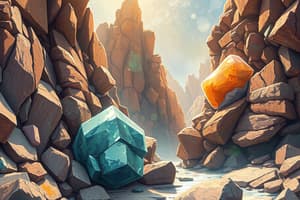Podcast
Questions and Answers
Which characteristic differentiates minerals from synthetic materials?
Which characteristic differentiates minerals from synthetic materials?
- Ordered Internal Structure
- Definite Chemical Composition
- Inorganic
- Naturally Occurring (correct)
What must all minerals contain to qualify as a mineral?
What must all minerals contain to qualify as a mineral?
- Organic compounds
- Ordered Internal Structure (correct)
- Gas formations
- Liquid forms
Which of the following best describes the chemical composition of minerals?
Which of the following best describes the chemical composition of minerals?
- It is irrelevant to the mineral's classification.
- It can vary significantly between samples.
- It is only based on the mineral's color.
- It must be expressed in specific ratios. (correct)
What type of processes do minerals exclude in their formation?
What type of processes do minerals exclude in their formation?
Which of the following is NOT a characteristic of minerals?
Which of the following is NOT a characteristic of minerals?
What phase of matter cannot be classified as a mineral?
What phase of matter cannot be classified as a mineral?
Which aspect of minerals refers to the internal arrangement of atoms?
Which aspect of minerals refers to the internal arrangement of atoms?
Which of the following would classify as a mineral?
Which of the following would classify as a mineral?
Which soil type is characterized as newly formed soils found in steep rocky lands?
Which soil type is characterized as newly formed soils found in steep rocky lands?
What is bituminization primarily associated with in the context of soil formation?
What is bituminization primarily associated with in the context of soil formation?
What is the primary factor determining the rate of soil formation?
What is the primary factor determining the rate of soil formation?
Which factor does NOT influence soil formation?
Which factor does NOT influence soil formation?
Which soil texture is defined as having particle sizes between 0.002 mm and 0.005 mm?
Which soil texture is defined as having particle sizes between 0.002 mm and 0.005 mm?
How does topography specifically influence soil formation?
How does topography specifically influence soil formation?
What type of soil is known as very weathered soils and is common in tropical climates?
What type of soil is known as very weathered soils and is common in tropical climates?
In the context of soil profiles, what is a key characteristic of each horizon?
In the context of soil profiles, what is a key characteristic of each horizon?
Which soil type is classified as very dry soils found in arid regions?
Which soil type is classified as very dry soils found in arid regions?
What is residual soil and how is it formed?
What is residual soil and how is it formed?
In what regions are Gelisols typically found?
In what regions are Gelisols typically found?
Which gas is primarily composed of methane and contributes to the formation of natural gas?
Which gas is primarily composed of methane and contributes to the formation of natural gas?
Which type of soil is composed primarily of volcanic ashes?
Which type of soil is composed primarily of volcanic ashes?
What role do biological factors play in soil formation?
What role do biological factors play in soil formation?
What term describes the relative proportion of sand, silt, and clay in soil?
What term describes the relative proportion of sand, silt, and clay in soil?
What is the main energy source derived from splitting atoms in a reactor?
What is the main energy source derived from splitting atoms in a reactor?
What are silicates primarily composed of?
What are silicates primarily composed of?
Which of the following describes intrusive igneous rocks?
Which of the following describes intrusive igneous rocks?
Which type of rock is characterized by being deposited and lithified at Earth's surface?
Which type of rock is characterized by being deposited and lithified at Earth's surface?
What is a characteristic of extrusive igneous rocks?
What is a characteristic of extrusive igneous rocks?
Which mineral is an example of a native metal?
Which mineral is an example of a native metal?
Which of the following is a major rock-forming mineral?
Which of the following is a major rock-forming mineral?
What type of rock is referred to when discussing the solidification of molten rock material?
What type of rock is referred to when discussing the solidification of molten rock material?
Which of the following igneous rocks typically forms amorphous glass due to rapid cooling?
Which of the following igneous rocks typically forms amorphous glass due to rapid cooling?
What are histosols characterized by?
What are histosols characterized by?
Which method helps in reducing the amount of waste produced?
Which method helps in reducing the amount of waste produced?
What type of waste comes from households and commercial establishments?
What type of waste comes from households and commercial establishments?
What is the consequence of excessive agricultural waste being deposited into water bodies?
What is the consequence of excessive agricultural waste being deposited into water bodies?
Which of the following best describes composting?
Which of the following best describes composting?
What does agricultural waste primarily consist of?
What does agricultural waste primarily consist of?
What is the main chemical composition of water?
What is the main chemical composition of water?
Which process involves collecting throwaway materials and converting them into essential products?
Which process involves collecting throwaway materials and converting them into essential products?
Flashcards are hidden until you start studying
Study Notes
Minerals
- Minerals are homogeneous, naturally occurring, inorganic solids with a definite chemical composition and ordered internal structure.
- Characteristics of minerals include:
- Naturally occurring: Must exist in nature; artificial materials like steel are excluded.
- Inorganic: Formed through inorganic processes, excluding organic materials from living organisms.
- Solids: Excludes liquids and gases; minerals must be solid.
- Definite chemical composition: Defined chemical formula with specific ratios of elements and compounds.
- Ordered internal structure: Atoms organized in regular, repetitive geometric patterns or crystal structures.
Classification of Minerals
- Silicates: Major rock-forming minerals primarily composed of silicon-oxygen tetrahedrons (SiO4); examples include olivine and quartz.
- Native Metals: Composed of a single metal; examples include copper, gold, and silver.
Types of Rocks
- Rocks are combinations of minerals, with three main types:
- Igneous Rocks: Formed from the solidification of molten rock material; classified into:
- Intrusive Igneous Rocks: Crystallize below Earth's surface, forming large crystals due to slow cooling.
- Extrusive Igneous Rocks: Erupt onto the surface, cooling quickly to form small crystals; may create amorphous glass.
- Sedimentary Rocks: Formed from lithified materials at Earth's surface, often assisted by water, wind, or biological processes.
- Metamorphic Rocks: Not directly defined but involve transformation processes.
- Igneous Rocks: Formed from the solidification of molten rock material; classified into:
Soil Formation Factors
- Parent Material: The underlying rock's chemistry and type determine the resulting soil.
- Climate: Temperature, rainfall, and moisture influence weathering processes and soil formation.
- Topography: Soil on steep slopes tends to be thinner due to higher erosion rates; affects water flow.
- Biological Factors: Organic contributions from plant roots and microorganisms enhance nutrient exchanges and soil mixing.
- Time: Soil formation is a gradual process, potentially taking hundreds to thousands of years.
Soil Textural Triangle
- Soil texture is determined by the relative proportions of sand, silt, and clay:
- Clay: 0.002mm or smaller
- Silt: 0.002 – 0.005mm
- Sand: 0.005 – 2.00mm
Soil Types
- Entisols: Newly formed soils found in steep, rocky areas.
- Inceptisols: Slightly developed soils in steep slopes and mountains.
- Gelisols: Frozen soils in the coldest regions.
- Spodosols: Sandy, acidic soils in moist climates that support dense forests.
- Alfisols: Moderately weathered, productive soils in temperate, humid regions.
- Ultisols: Very weathered soils, often found in warmer climates.
- Aridisols: Dry soils found in arid regions.
- Mollisols: Deep, fertile soils typically found in grassland regions.
- Oxisols: Highly weathered soils common in tropical climates.
- Andisols: Soils derived from volcanic ash.
- Histosols: Soils with high organic content, typically wet environments.
Solid Waste
- Comprised of items discarded by communities; types include:
- Municipal Waste: Includes materials no longer wanted from households and businesses.
- Agricultural Waste: Organic waste from farming; can be used to enhance soil or burned for energy.
- Industrial Waste: By-products from industrial processes; management is crucial due to potential toxicity.
Water Resources
- Water is a compound made of two hydrogen atoms and one oxygen atom, essential for various ecological processes.
Studying That Suits You
Use AI to generate personalized quizzes and flashcards to suit your learning preferences.




